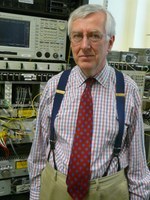
NDFF Response to BIS Capital Consultation
Dark fibre is optical fibre that users can access at the optical data level rather than the electrical data level as in conventional communications networks. Access at the optical level enables users to experiment with novel communication techniques, such as high order optical modulation or quantum communication. The new service builds on previous work carried out by the consortium using a fixed path dark fibre network, Janet Aurora. The new network will offer programmable transmission parameters, dynamic reconfiguration into multiple sub-networks and the ability to handle multiple transmission formats simultaneously.
As well as supporting research on the future core optical network, which underpins the internet, NDFF will also enable research with experimental metro networks, such as the Gigabit Bristol network. NDFF will also support research on wireless backhaul networks for future Wireless Systems such as 5G.
NDFF provides a key resource to researchers developing the future wireless and optical communications systems that will underpin the future internet.
Although, it is possible for researchers throughout the UK to send data and conduct research on the NDFF Aurora2 network the geographical reach of the dark fibres forming the physical layer of the network is currently limited to the southern part of the UK. We therefore propose that the reach of the Aurora2 network be extended by adding fibre routes to expand the geographical coverage to include further major centres of communications and networking research, through a northwards extension of the network, including for example Birmingham, Manchester, Lancaster, Strathclyde, Edinburgh and Northern Ireland. The cost of this enhancement would be £5m to £15m, depending on geographical extent.
Creating a Nationwide Dark Fibre Research Network would enable large scale experimentation to study flexible and reconfigurable networks offering unprecedented capacity. This will enable UK researchers to remain at the forefront of technology research for the future internet and its applications.
UK Photonics and UK electronics are large industries with annual revenues of £10 billion and £29 billion respectively. We will be working with leading UK companies to transfer technologies developed with the aid of NDFF into new products and services. The benefits to the UK economy will be correspondingly large.
Published: 07 November 2017
